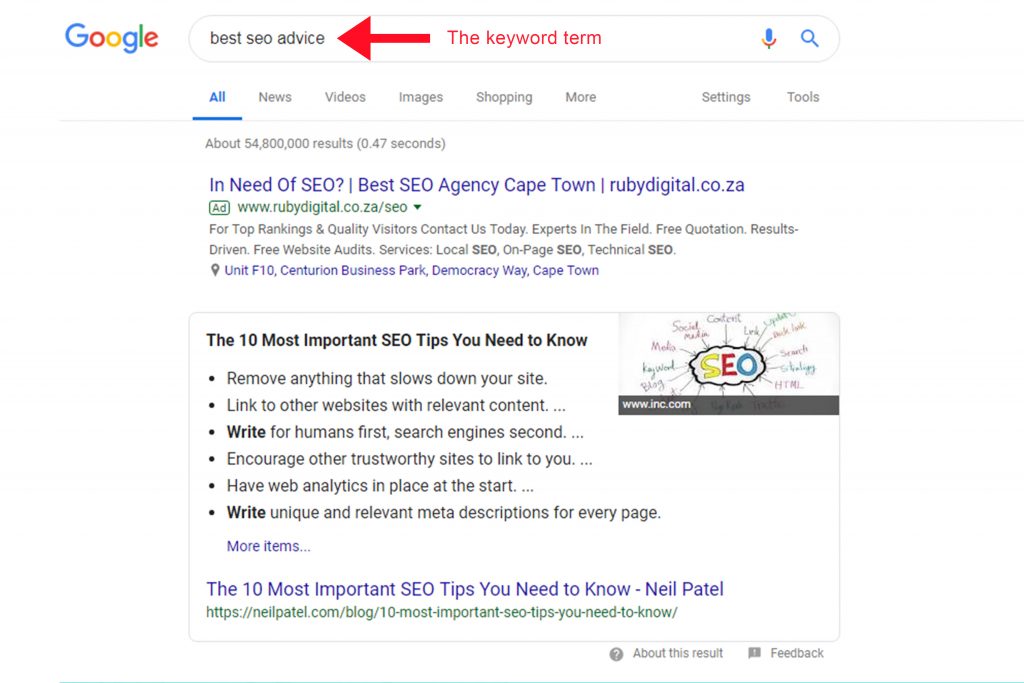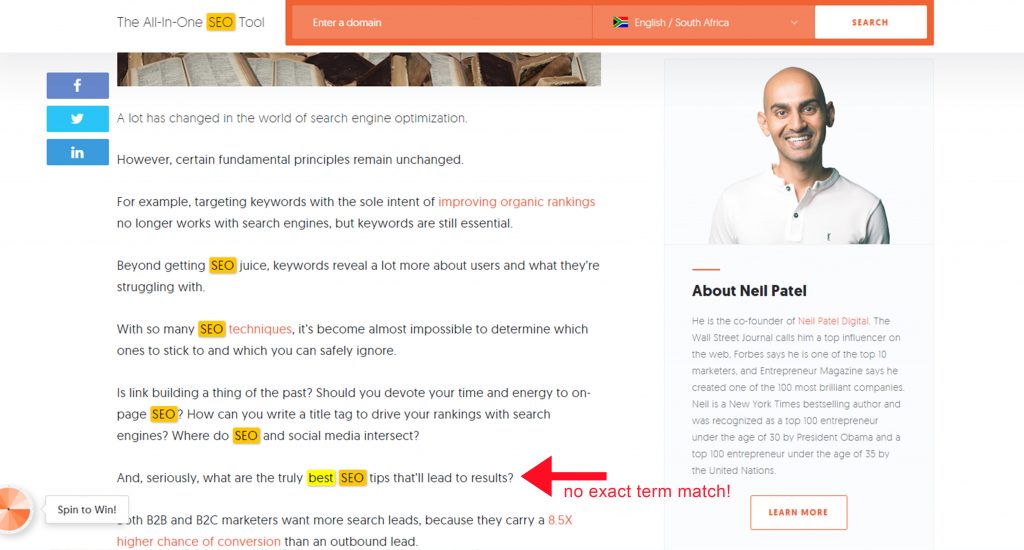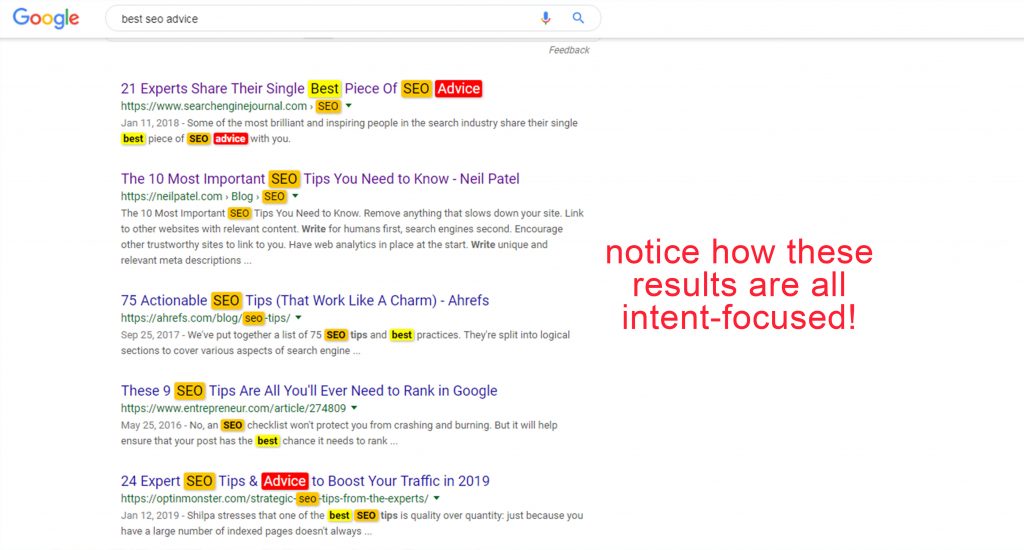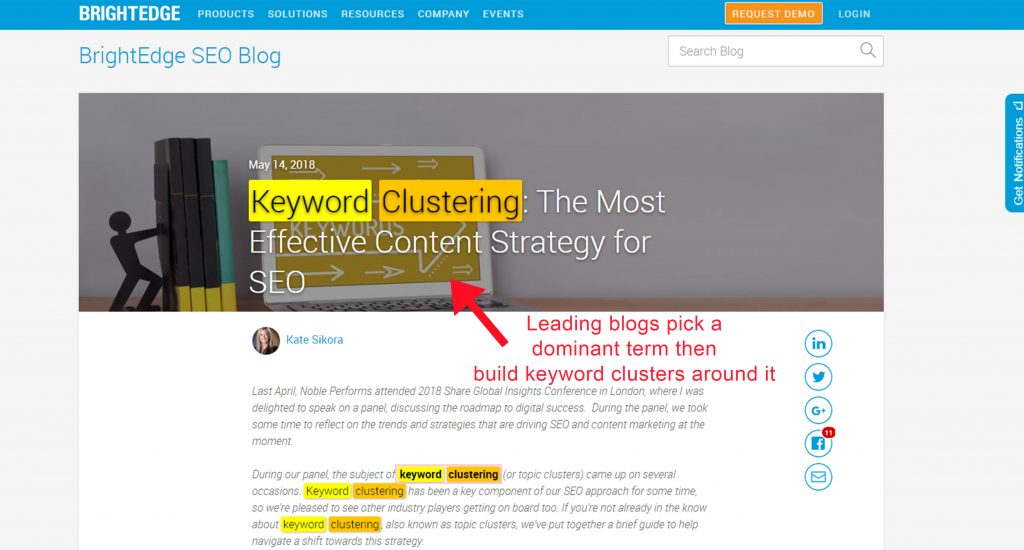What are Keywords?
What are keywords and why should you be paying special attention to them in your content? Here is a quick-start summary of what SEO keywords really are.
Category
Website Copywriting
05 September, 2021
The Definition of SEO Keywords
In SEO, keywords are search terms that are used in your online content. These terms help visitors discover your website after using a search engine to find appropriate goods, services, communities or information.
Keywords Definition Example

In the above example, I’ve used the search term ‘best SEO advice.’
This is the keyword phrase I’ve chosen to use in Google search, to discover websites and marketing personalities that offer great SEO tips and tricks.
Quality search terms are based on search intent, and every page of your website should have a set of target keywords that work to align your content goals and attract organic traffic to that page.
Neil Patel pops up first in a featured snippet for this term, not because he’s used the direct phrase ‘best SEO advice,’ multiple times in a blog post.
It’s more complex than that!
Google uses over 200 ranking factors to determine content quality, and understands that this post is the ‘best SEO advice’ available online. Google trusts Neil Patel’s post, because it checks all of the on-page optimization boxes.
NorthCutt has a great post on which factors are concrete, probable or plain mythological here.
My advice would be to review your on-page optimization ranking factors, and make sure all of them are covered before you focus on keyword targeting.
A Search Engine’s Main Goal
A search engine’s job is to process a search term, and return the most accurate, useful, and valuable answer. That’s why Google is obsessed with quality content.
It’s their mandate!
It’s also why Google features Neil Patel’s post, while other websites like Searchenginejournal.com are being overshadowed.
Technically, SEJ has closer keyword matches than Neil – but what matters to Google is which of the two posts provides the highest value based on search intent.

Neil’s post is higher quality because it’s actionable for the reader, contains video and key graphics that enhance the educational value of the post, and he’s packed the post with stats and links to additional resources.

The SEJ post is also excellent quality, with key influencers sharing important advice. Though this SEO advice is broad and generalised.
In terms of search intent, it falls short.

To be fair, it’s possible neither of these sites were directly competing for the term ‘best SEO advice.’ The big SEO powers know that you can rank for multiple search terms in a single piece of content.
The secret is:
- Keywords are not just direct phrases to be inserted into your content anymore. They are also critical features in your content strategy, and guidelines for maximizing search intent.
Search terms exist to help you create the high quality content that is going to work with a host of other ranking factors, to get you strong PQ (page quality) scores.
Thanks to Google Rankbrain better understanding the meaning behind keywords – if you want to win with your keyword strategy in 2019 and beyond, you need to focus on matching search intent.
- Match search intent
- Less focus on direct keyword phrases
Organic rankings are what you are competing for when you engage in organic optimization or on-page SEO. The goal is to create the highest quality content possible, in relation to your competitors. You can do this by basing your keyword strategy on search intent.
A strong keyword strategy is the best on-page optimization measure a business can invest in, when their goal is to rank better for multiple terms, and attract more page visitors.
What Are Target Keywords?

Target keywords, also called focus or lead keywords, are keyword phrases that best describe your page content.
Once upon a time, it was enough to have a single primary keyword, and to place it in certain areas of your content. Today, that’s close to irrelevant for competitive ranking.
In 2019, your target keywords should consist of one dominant keyword that describes your content, and a list of additional keywords that form your keyword cluster.

A keyword cluster is a set of keyword terms that are semantically related to each other. Typically, these keywords overlap and help a specific page rank for multiple terms.
There are many techniques for creating keyword clusters using modern SEO tools. These tools give you lists of semantically related keywords that you can build into your page content.
When building keyword clusters, consider semantic relevance. Google has sophisticated machine learning technologies for understanding keyword connections.
Keyword clusters must be:
- Highly relevant to your dominant search term / page content
- Logically related to each other
- Appease click satisfaction
Instead of latent semantic indexing (which I believe to be an over simplified method of grouping keywords), focusing on co-occurrence (a related concept) is good for keyword clustering.
Remember, no-one truly knows how search engine algorithms work. Organic ranking processes are often theoretical. What works for one company, may not work as well for another.
What Are Keywords: The Summary
In on-page SEO, keywords are the terms a web content creator will use on each page to attract and orientate your page visitors. They should be firmly based on search intent, and be surrounded by relevant, evidence-based keyword clusters.
Every page of your website should have a dedicated keyword set. This group of keywords will help you create relevant, user-centric content that is valuable for your online users.
Why are you researching keywords? Tell me about it below.

Written by Carla Dewing
I’m a content strategist, creator and director. I’m a bit obsessed with SEO, conversion optimization and the internet. One day, I’ll master the electric ukulele, get my pilot’s license and won’t eat so much chocolate. Maybe not the last one.
Let's Keep in Touch
Sign-up and I’ll let you know when a new post is published
